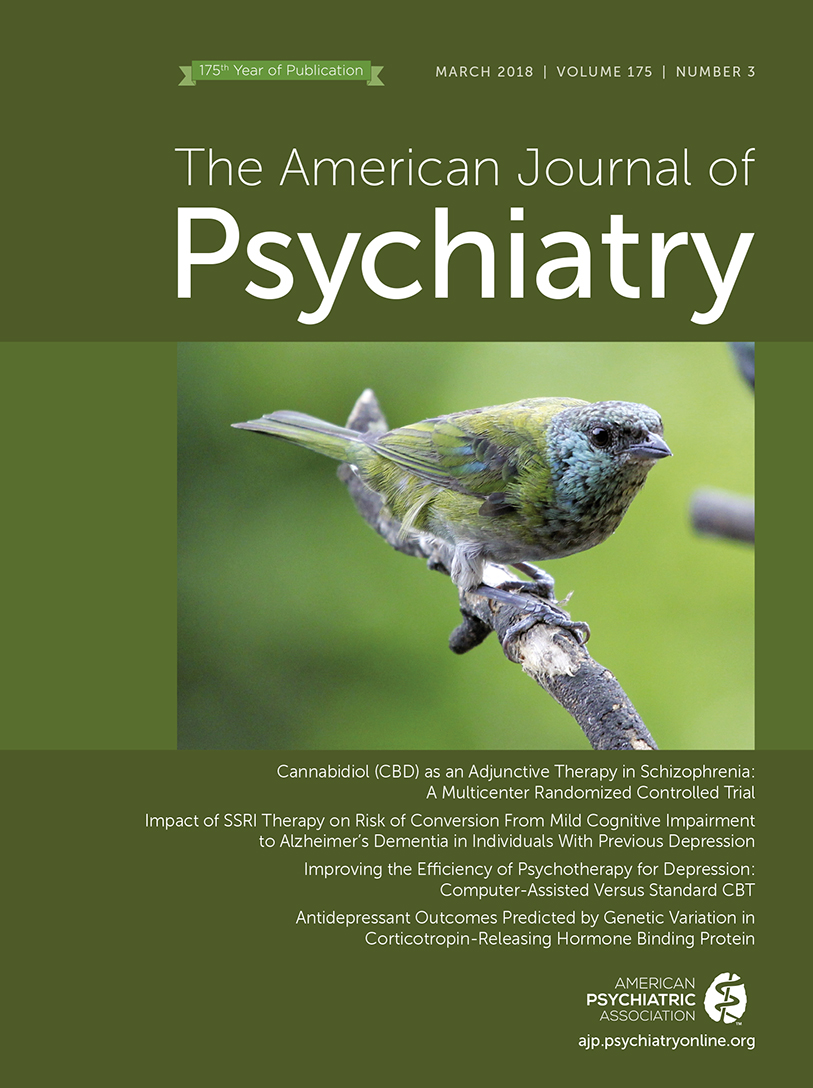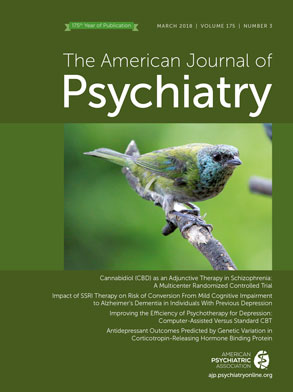Cannabis has been the focus of many investigations over the past three decades regarding its contribution to the emergence or exacerbation of psychosis. Epidemiological studies have consistently reported an increased risk of psychosis in cannabis users (
1). Moreover, the acute use of cannabis, particularly at high doses, induces acute psychotic-like symptoms in healthy volunteers and exacerbates existing psychosis in patients with schizophrenia (
2). Cannabis contains more than 100 cannabinoids (
3), however, and this has become an important discussion point in debates regarding cannabis and psychosis vulnerability. While Δ9-tetrahydrocannabinol (THC) is the major active cannabinoid known to be responsible for cannabis’s psychotomimetic effects (
4), there is a growing line of evidence suggesting that cannabidiol (CBD), another phytocannabinoid in the plant, has opposing properties (
5). Such differential actions of THC and CBD on psychosis have been implicated in multiple studies of cannabis users showing, for example, that recreational users of high-CBD cannabis strains experience less psychotic-like symptoms (
6). Additionally, CBD attenuates the acute psychotic-like effects of THC administration in healthy volunteers (
7), and preclinical studies have demonstrated that concurrent CBD antagonizes THC-induced cognitive and behavioral abnormalities commonly associated with schizophrenia (
8).
In this issue, McGuire at al. (
9) report on the effects of CBD on psychosis in an exploratory 8-week, multicenter, randomized, double-blind, placebo-controlled, parallel-group clinical trial in patients with schizophrenia. The participants had been maintained on a stable dosage of antipsychotic medication (mainly atypical agents) for a minimum of 4 weeks before entering the study. Patients were randomly assigned to receive an oral solution of CBD (1000 mg/day, split between the morning and the evening; N=43) or placebo (N=45) in addition to their antipsychotic medication, which was continued unchanged throughout the trial. The authors conducted a series of measures to assess severity of symptoms, clinical improvement, level of functioning, and cognitive performance before and after the trial. The results demonstrate that patients receiving CBD had significantly lower levels of positive psychotic symptoms, higher clinical improvement scores, and better cognitive performance compared with the placebo group.
The study is important because it is the first placebo-controlled clinical trial that has assessed the antipsychotic effects of CBD, and its findings are consistent with other clinical investigations affirming CBD’s antipsychotic properties (
10,
11). Previously, in a small open-label trial (N=6), flexible dosages of CBD for 4 weeks were found to reduce psychotic symptoms in patients with Parkinson’s disease treated with dopaminergic medications (
11). In the only other published double-blind randomized controlled clinical trial (
10), CBD was shown to be as effective as amisulpride, an effective second-generation antipsychotic, in treating acute psychotic symptoms in patients with schizophrenia. In addition, as in the McGuire et al. study, patients treated with CBD experienced minimal adverse effects and no significant extrapyramidal symptoms, increase in prolactin levels, or weight gain, which are commonly associated with the currently used antipsychotic medications.
Overall, the McGuire et al. study provides an important foundation that adds to the growing literature highlighting the antipsychotic and procognitive potential of CBD. The magnitude of the CBD effects were modest, which is perhaps not surprising given that the patients were already adequately maintained on an antipsychotic regimen before receiving the cannabinoid treatment. Nevertheless, even a modest improvement in positive symptoms and cognition can have a significant clinical impact and improve quality of life for patients. It remains to be addressed in future studies whether CBD as an adjunctive treatment can help ultimately to reduce dosages of antipsychotic medications (and their related side effects) or can be effective on its own as a long-term medication for schizophrenia.
The exact mechanism underlying the antipsychotic effects of CBD is still unknown, although minimal dopaminergic perturbation suggests that CBD differs from the classical dopamine-targeting medications. It has been proposed that CBD inhibits the hydrolysis of anandamide, one of the main endocannabinoid ligands, by blocking its degrading enzyme, fatty acid amide hydrolase, or by competing with anandamide intracellular transporters (
12). Interestingly, anandamide levels are negatively correlated with severity of psychotic symptoms (
13), and increased anandamide levels in psychotic patients treated with CBD are correlated with clinical improvement (
10).
Studies of the antipsychotic properties of CBD not only have significant value in the potential development of a new class of antipsychotic medications but are also of critical public health importance. Cannabis continues to be the most commonly used illicit drug in the United States, and as more states legalize its use for medical and recreational purposes, the perception of the risk associated with cannabis use has decreased. At the same time, however, the THC-to-CBD ratio of street cannabis has increased over the years, from 14:1 in 1995 to 80:1 in 2014 (
3). Differentiating the antipsychotic properties of CBD from the propsychotic effects of THC is vital to distinguishing the potential mental health benefits of “medicinal CBD” from the adverse effects of high-potency street cannabis.

